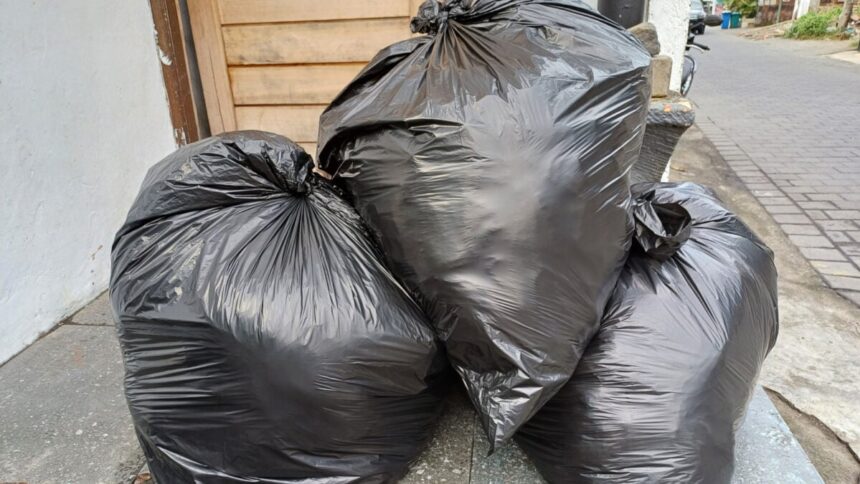Until a few years ago, the town of Plympton, Massachusetts, was quite literally throwing away money. People were producing so much trash that it was threatening to put the municipal transfer station out of business.
Under the town’s system, residents would buy a $240 sticker for their cars that allowed them yearlong access to the dump, where they could dispose of as much garbage as they wished. But the sheer volume, combined with climbing landfill fees, meant that this service was costing the local government nearly twice what it was taking in.
One solution was to double the price of dump stickers, but that would hit Plympton’s low-income population particularly hard and wouldn’t have been fair to smaller households—like seniors—that produced minimal trash. So, the town of roughly 3,000 decided to try something that it had seen other municipalities do: charge per bag.
“It virtually cut waste in half,” Rob Firlotte, Plympton’s highway superintendent, said of the results. In 2022, before the new system, the town threw away 640 tons of trash. Last year, that figure was 335 tons. “It pushed people toward recycling more, because it saves them money,” Firlotte said.
Stickers now sell for $65 each, and residents purchase specially marked garbage bags priced by the size ($1.25 for a 15-gallon bag, $2.50 for 33 gallons). That means a household producing one small bag of trash each week would spend $130 per year—$350 less than they would have if Plympton had decided to double its sticker prices instead. The town says it has cut its trash disposal bill roughly in half, saving about $65,000 a year.
“We went from a deficit to breaking even,” said Firlotte.
Plympton isn’t alone in its success. According to the Massachusetts Department of Environmental Protection, nearly half of the state’s 351 municipalities have adopted a version of this “pay-as-you-throw,” or PAYT, model. In 2023, places with PAYT collected roughly one-third less waste, or some 513 pounds per household. A 2018 study in New Hampshire detailed similarly stark differences.
“We found that demand for waste disposal was really responsive to price,” said John Halstead, an author of that research and a retired professor of environmental economics at the University of New Hampshire. “If you raise the price of trash, people are going to find ways to not put as much out at the curb.”
Many other countries have utilized pay-by-volume trash collection for decades. There are limited examples in the U.S. dating to the early 20th century, said Lisa Skumatz, president of Skumatz Economic Research Associates, an energy, recycling, and sustainability consultancy. But contemporary implementation in America really began to surge in the 1980s through the early 2000s, and has seen steady growth since then.
While there’s no recent national data on PAYT, Skumatz estimates that about a quarter of people in the United States have access to some sort of volume-based program. That includes not only branded-bag models like Plympton’s, but programs with prices based on the size of the bins (as in Denver and Seattle), or in which people tag every bag of garbage (as is the case with at least one hauler in Burlington, Vermont). All Oregon communities have access to some iteration of PAYT, and the Natural Resources Defense Council has a model bill that others can use if they are considering giving it a try.
One of the keys to success is making sure the alternatives to the landfill—like recycling and compost—are as robust as possible. “You’ve really got to be able to make it easy for households to reduce their trash,” said Linda Breggin, a senior attorney at the nonprofit Environmental Law Institute. Aside from saving money, she also noted that producing less trash can mean fewer greenhouse gas emissions from landfills or incinerators and can boost the supply of recycled material, which then avoids virgin material being used.
“You get a lot of co-benefits,” she said.
Still, change often meets resistance. Haulers, for example, often prefer the simplicity of bulk trash when making hundreds of curbside stops (they also frequently own the landfills that charge by the ton). For residents, a trash fee that may have been baked into their taxes could suddenly become visible.
“People have been used to all-you-can-eat trash for decades,” said Skumatz. “[But] all-you-can-eat buffets lead to a lot of waste and a lot of bad behaviors.”
There are three major ways to produce less trash—reducing waste in the first place, and diverting it to recycling or compost instead of a landfill. Paying by the bag encourages all of those alternatives and also helps reach beyond the core cohort of diehards, or environmentalists, who already reduce, reuse, and recycle.
“You have to get the next group and the next group,” said Skumatz. “A lot of those people respond to financial incentives.”
A primary argument among pay-as-you-throw skeptics is that it could lead to illegal dumping. But Skumatz said that of the roughly 1,000 towns she surveyed, only a quarter saw any uptick in that and, even then, it only lasted about three months. Although it’s harder to tell whether PAYT leads people to clutter the recycling stream with garbage, it’s not a problem she’s heard many complaints about.
“After six months, people tend to really prefer PAYT over the previous system,” she said. “But it’s really hard for a lot of communities to get through that.”
Firlotte said that Plympton saw some grumbling at first, but not a ton given that the alternative was doubling the sticker price. Senior citizens have been particularly excited about the new approach, given how little trash they tend to produce. From the beginning, officials were also diligent about discouraging illegal dumping or dirtying the recycling stream, so Firlotte said cheating has been a virtual nonissue.
“For us,” he said, “it worked out great.”
This article originally appeared in Grist at https://grist.org/accountability/what-one-town-learned-by-charging-residents-for-every-bag-of-trash/. Grist is a nonprofit, independent media organization dedicated to telling stories of climate solutions and a just future. Learn more at Grist.org.
Read the full article here












